Overview
The central inquiry of the article focuses on how AI trends are revolutionizing title research within property technology. It delineates various AI applications, including automated document processing and predictive analytics, which streamline workflows, enhance accuracy, and bolster decision-making. Consequently, this underscores the imperative for property professionals to embrace these innovations to maintain competitiveness in an industry that is evolving at a rapid pace.
Introduction
As the real estate industry rapidly evolves, the integration of artificial intelligence into property technology is emerging as a game-changer, particularly in the realm of title research. This article delves into ten transformative AI trends that are revolutionizing how property professionals approach their work, from automating document processing to enhancing customer engagement.
Furthermore, as these innovations reshape workflows and expectations, the pressing question remains: how can property firms effectively adapt to and leverage these advancements to stay competitive in an increasingly tech-driven market?
Parse AI: Automating Document Processing for Title Research
Parse AI leverages advanced machine learning algorithms and optical character recognition to transform the extraction of critical information from title documents. This significantly diminishes the time and effort that title researchers invest in compiling abstracts and reports, allowing them to focus on more complex tasks. By substantially reducing human errors and enhancing data accuracy, Parse AI revolutionizes the traditional title research workflow, resulting in a faster and more dependable process for property professionals.
As the industry evolves, the incorporation of AI trends in property technology is not just a trend; it is a vital necessity. Numerous property firms are already employing machine learning as part of the AI trends in property technology for title document automation to boost efficiency and precision. According to Gartner, the adoption of AI trends in property technology by businesses has surged by over 270%, mirroring a broader trend evident in the real estate sector.
Furthermore, with the global AI market projected to experience significant growth by 2027, the imperative for title researchers to adopt AI trends in property technology becomes increasingly apparent. Bernard Marr notably asserts that AI will enhance human intelligence rather than replace it, highlighting the collaborative potential of AI in transforming workflows.
Case studies reveal that businesses implementing intelligent document processing (IDP) systems can quantify ROI through time and cost savings, further substantiating the advantages of automation in title research.
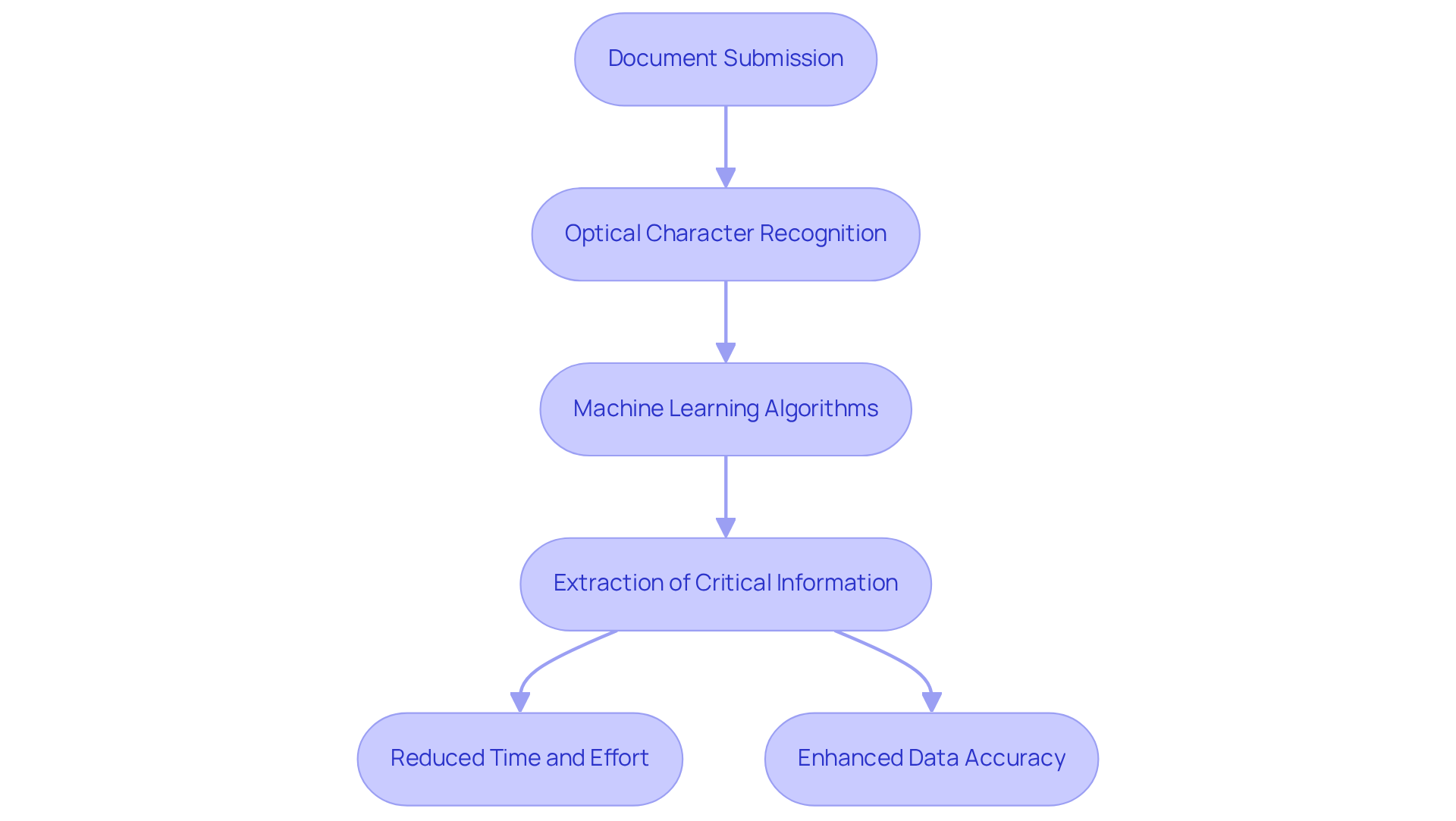
Predictive Analytics: Enhancing Market Forecasting in Real Estate
[Predictive analytics utilizes AI trends in property technology](https://jasminedirectory.com/blog/predictive-analytics-forecasting-real-estate-market-trends) by leveraging historical data alongside machine learning models to accurately forecast future market trends and property values. By meticulously analyzing patterns in data, real estate professionals are empowered to make informed decisions regarding investments and pricing strategies. This innovative approach not only aids in identifying emerging markets but also highlights associated with AI trends in property technology, enabling stakeholders to proactively adjust their strategies and enhance their portfolios.
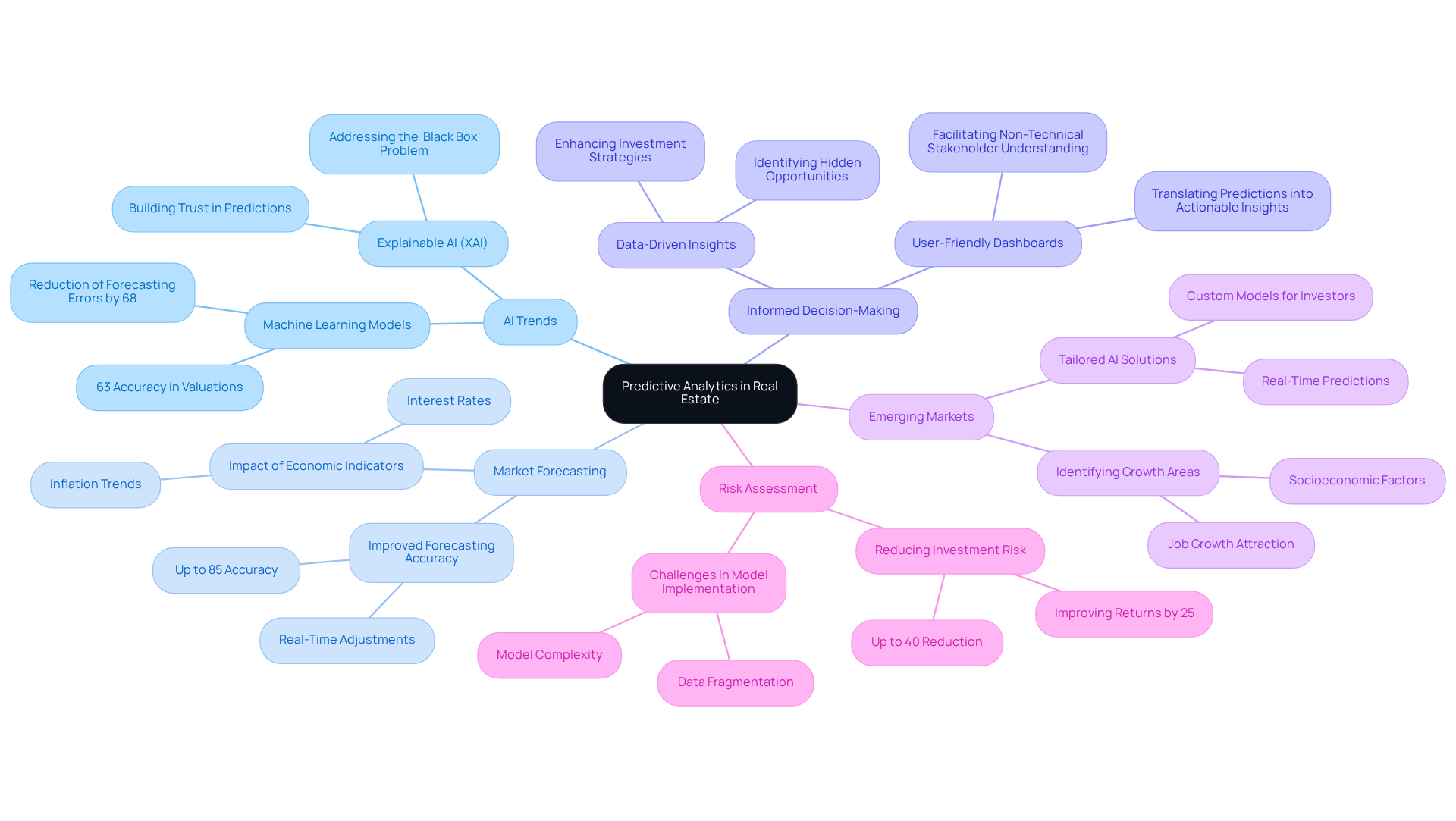
Virtual Property Tours: Transforming Buyer Engagement with AI
Virtual tours, enhanced by , empower prospective buyers to explore listings from the comfort of their homes. These immersive experiences significantly boost buyer engagement by offering a realistic perspective of the property layout and features. Furthermore, by integrating virtual tours into their marketing strategies, property professionals can attract a larger pool of prospects and facilitate quicker decision-making. Consequently, this approach ultimately leads to increased sales.
Personalized Marketing Campaigns: Leveraging AI for Targeted Outreach
AI-driven customized marketing initiatives leverage data analysis to scrutinize consumer behavior and preferences, which helps property professionals stay informed about AI trends in property technology and deliver personalized content to prospective clients. This effectively resonates with specific demographics, significantly enhancing engagement and boosting conversion rates.
For instance, personalized calls to action outperform generic versions by an impressive 202%. Additionally, 44% of customers return to brands that offer personalized service, underscoring the effectiveness of tailored marketing approaches. Furthermore, 52% of consumers report heightened satisfaction when experiences are personalized, and 80% of businesses witness increased consumer spending under similar conditions.
By harnessing these insights, property firms can refine their marketing efforts, making them not only more efficient but also more effective in reaching and converting potential clients. As Berfin Cezim aptly notes, optimizing digital strategies is essential for maintaining competitiveness in today’s market. In addition, listings that incorporate video receive 49% more qualified leads, highlighting the critical importance of engaging content in marketing strategies.
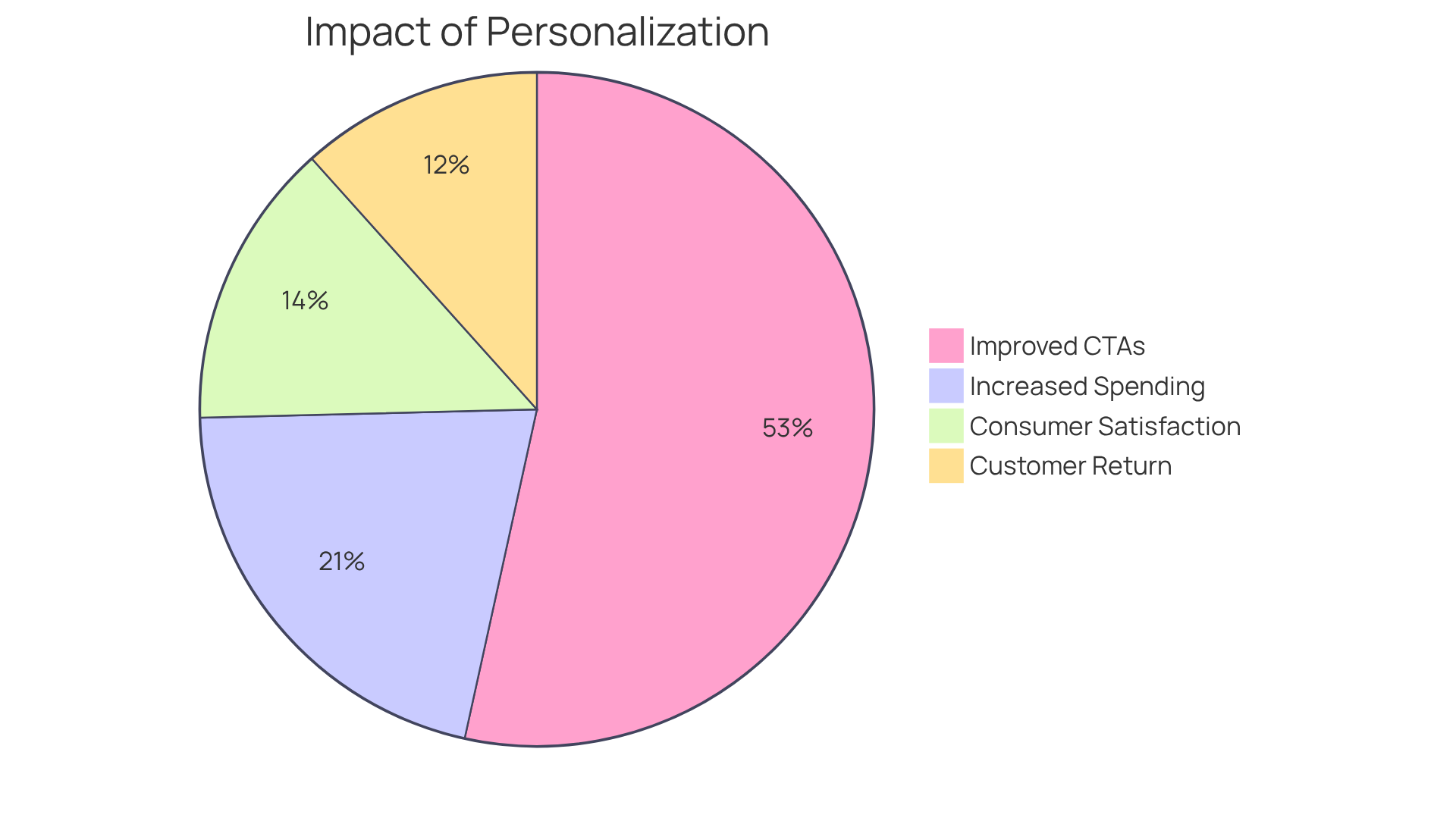
Chatbots: Streamlining Customer Support in Real Estate
AI-driven chatbots are revolutionizing customer assistance in the property sector by delivering immediate responses to inquiries, thereby enhancing the overall support process. These virtual assistants efficiently manage routine questions, schedule property viewings, and provide comprehensive information about listings around the clock. By automating these interactions, property professionals not only elevate client satisfaction but also liberate valuable time to focus on more complex client needs.
The implementation of chatbots has been proven to improve lead generation by 33%, underscoring their effectiveness in engaging clients and driving business growth. Furthermore, advanced AI chatbots can significantly reduce response times for routine inquiries by up to 80%, ensuring that customer expectations for fast and personalized service are consistently met. Notably, 35% of customer requests to AI assistants occur when customer contact centers are closed, highlighting the critical importance of 24/7 availability.
However, it is essential to acknowledge that as of 2024, only about 14% of property companies had adopted the latest AI trends in property technology. This statistic suggests a in property technology, while also indicating a considerable opportunity for further uptake. Additionally, while AI chatbots present numerous advantages, challenges such as high initial costs and data privacy concerns must be addressed to fully harness their potential.
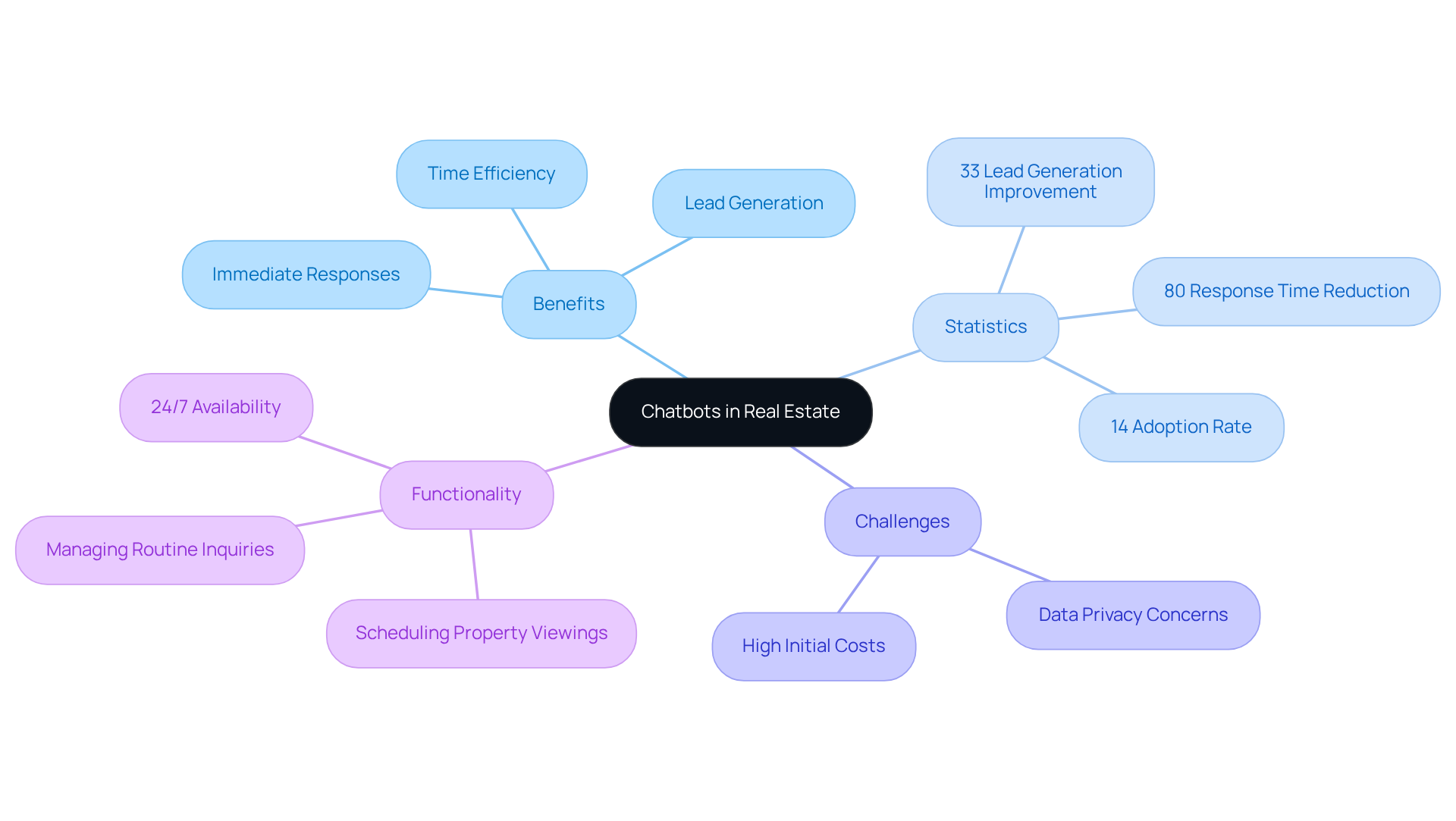
Automated Property Valuation: Accelerating Accurate Assessments
Automated valuation models utilize advanced AI algorithms to assess a multitude of factors, including location, characteristics of the asset, prevailing market trends, and AI trends in property technology. This groundbreaking technology significantly accelerates the , enabling property professionals to make swift, informed decisions. By diminishing reliance on traditional manual assessments, these automated valuations not only enhance operational efficiency but also improve accuracy in real estate transactions. In fact, AI-driven asset evaluation tools can achieve estimates with an impressive 3% error margin, underscoring their reliability in the fast-paced housing market.
As noted by Shalwa, the AI trends in property technology are revolutionizing marketing in the housing sector by providing tools that refine asset assessments. Furthermore, the growing AI trends in property technology are reflected in the AI property market, which was valued at USD 2.9 billion in 2024 and is projected to reach USD 41.5 billion by 2033, emphasizing the increasing dependence on AI innovations. As the sector increasingly embraces these advancements, the precision and speed of property evaluations are set to redefine benchmarks in property transactions.
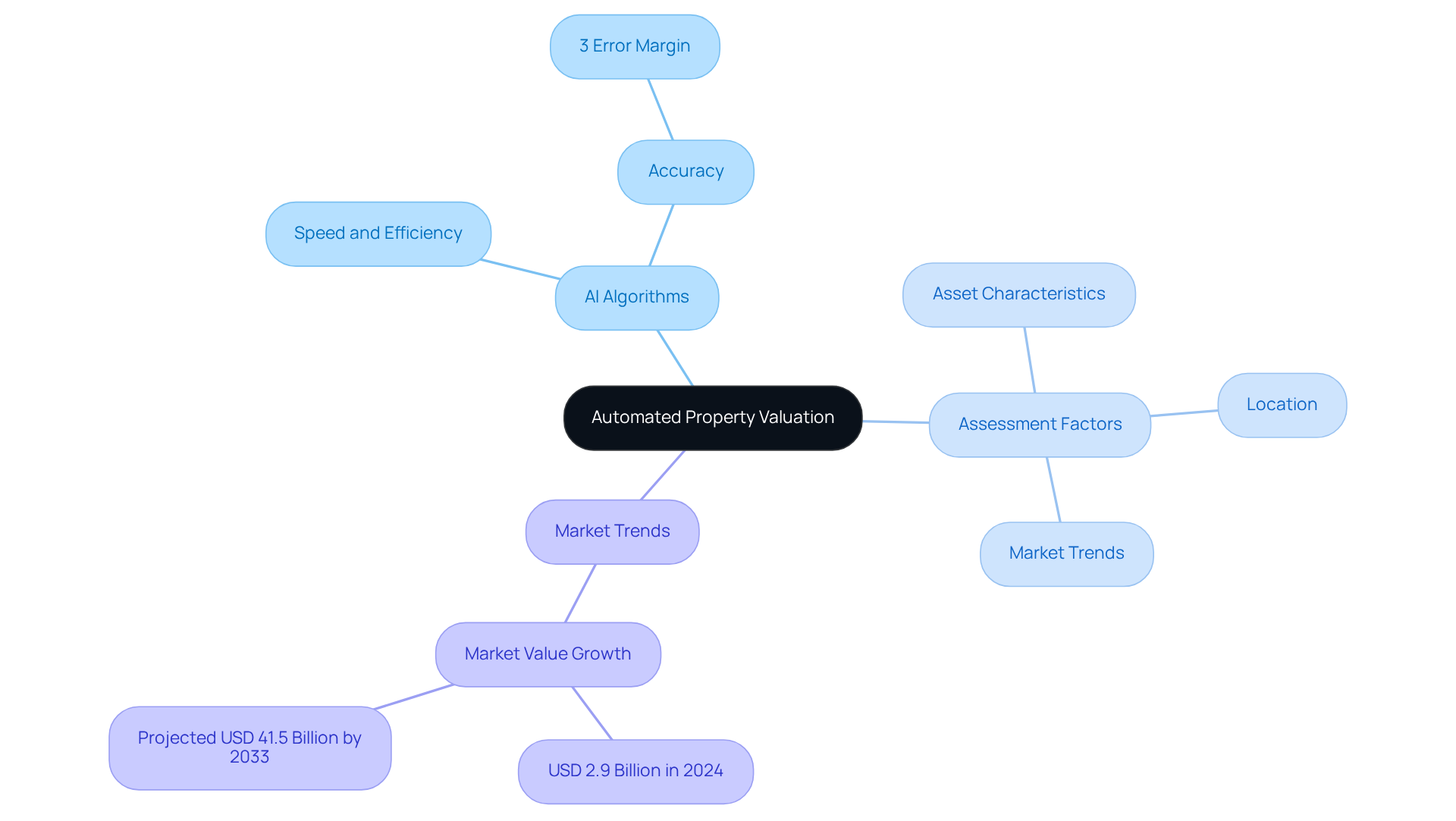
Smart Contract Management: Enhancing Transaction Security and Efficiency
Intelligent agreements leverage blockchain infrastructure to automate and safeguard property transactions, acting as self-enforcing contracts that ensure all parties meet their obligations before a deal is finalized. This innovative approach significantly mitigates the risk of fraud and disputes, thereby enhancing transaction security. By streamlining the closing process, smart contracts not only expedite transactions but also deliver a more reliable experience for all stakeholders involved.
A survey conducted in June 2023 indicates a growing commitment among property firms to invest in the implementation of smart contracts, showcasing the AI trends in property technology and reflecting a broader trend toward integrating advanced innovations within the sector. However, for smart contracts to emerge as a viable alternative, industry players must possess a comprehensive understanding of the system, as highlighted by Ivan Kot.
Furthermore, the acceptance of cryptocurrencies for payments by property companies globally in 2023 underscores the broader context of blockchain technology's impact on property transactions. While smart contracts present numerous advantages, challenges such as persist as significant obstacles to widespread adoption.
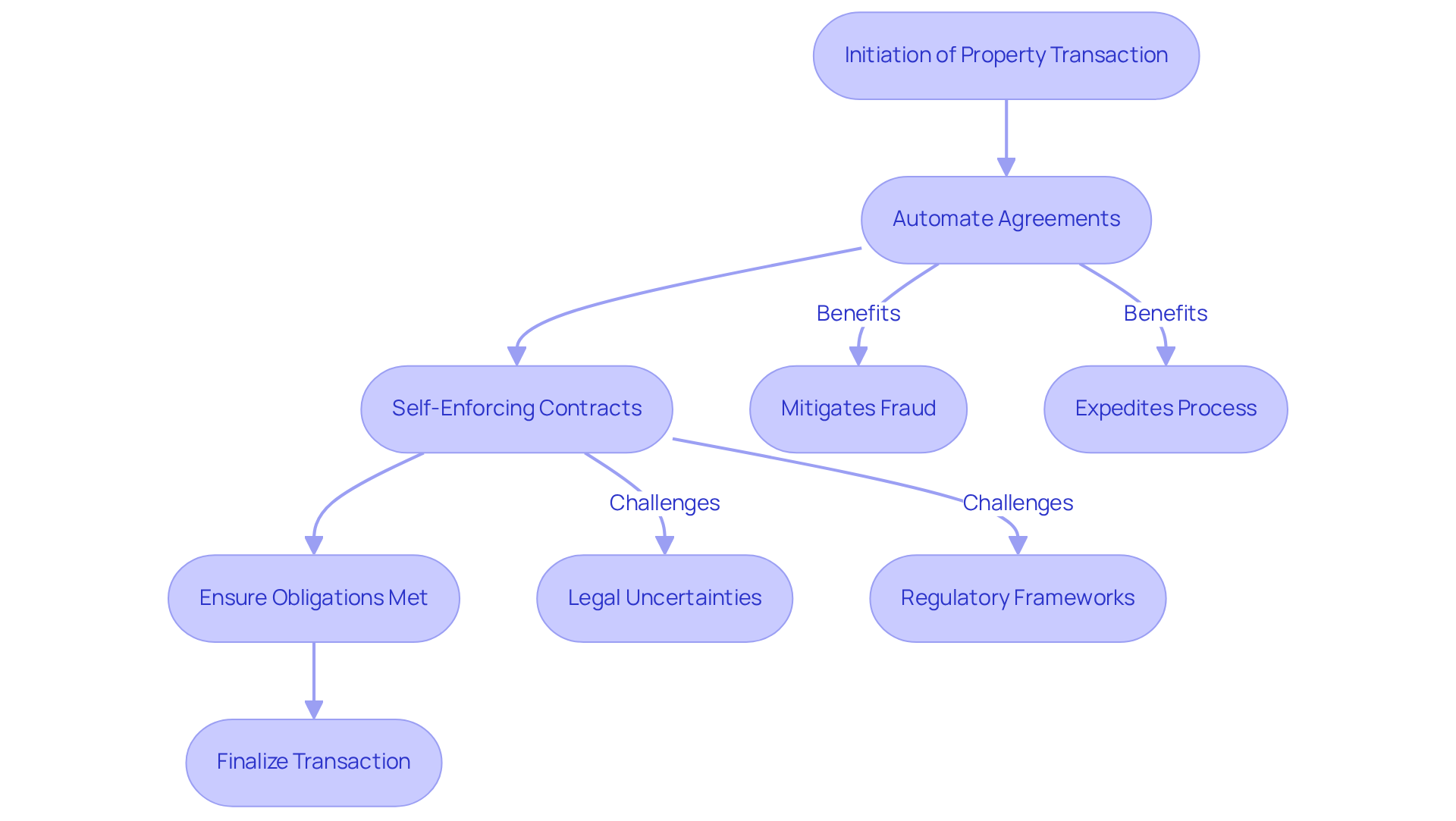
Dynamic Pricing Models: Adapting to Market Conditions with AI
Dynamic pricing models utilize AI trends in property technology to analyze real-time market data and adjust property prices accordingly. By taking into account critical factors such as demand, competition, and economic indicators, property professionals can optimize their pricing strategies to maximize profitability. This adaptability not only allows stakeholders to but also ensures they capitalize on opportunities as they arise. Consequently, the integration of AI trends in property technology into pricing strategies is not merely advantageous; it is essential for sustained success.
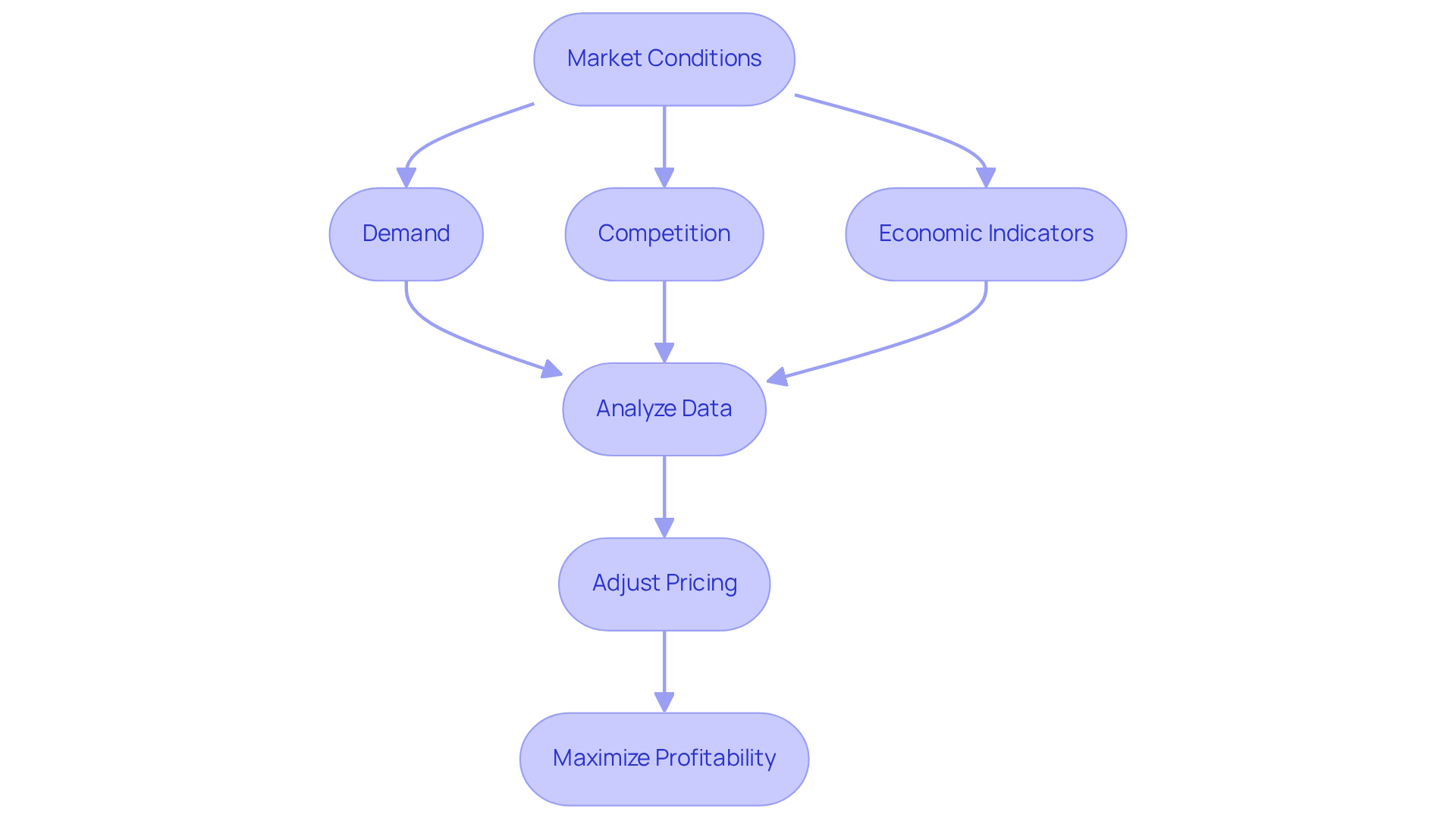
Fraud Detection: Safeguarding Transactions with AI Technologies
AI advancements play a pivotal role in the fight against fraud in property transactions. By meticulously analyzing transaction data for patterns and anomalies, these systems swiftly identify potential fraud risks, alerting stakeholders before issues escalate. This not only fortifies the security of property transactions but also protects buyers and sellers from significant financial losses, thereby upholding the integrity of the industry. Notably, DBS's AI-based fraud detection system has enhanced precision and capture rates by 50%, underscoring the effectiveness of AI in this area.
As Chew Chong Lim, DBS group head of real estate, stated, 'We are deeply honoured to be recognised as the world’s best bank for real estate by Euromoney,' highlighting the importance of innovative advancements such as AI in bolstering transaction security. The integration of AI trends in property technology exemplifies how technology is transforming the landscape of real estate transactions, ensuring a safer and more reliable process for all parties involved.
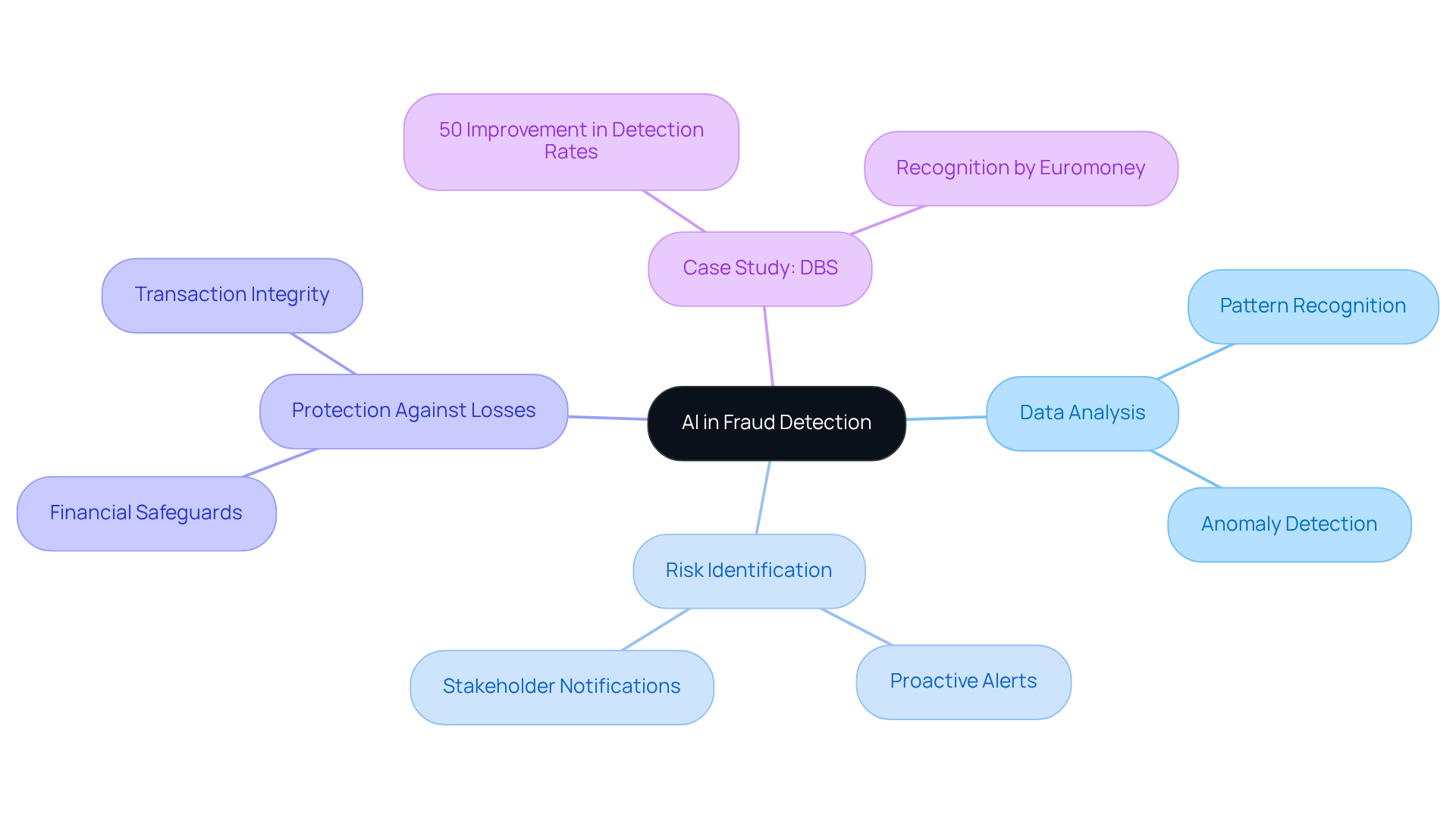
Energy Efficiency Assessments: Promoting Sustainability with AI
AI-driven energy efficiency evaluations play a pivotal role in assessing buildings for their energy usage and sustainability characteristics. By identifying areas for enhancement, industry experts can significantly boost property value and attract environmentally conscious purchasers. This not only addresses market demand but also contributes to broader environmental goals. Consequently, real estate professionals are positioned as leaders in responsible property management.
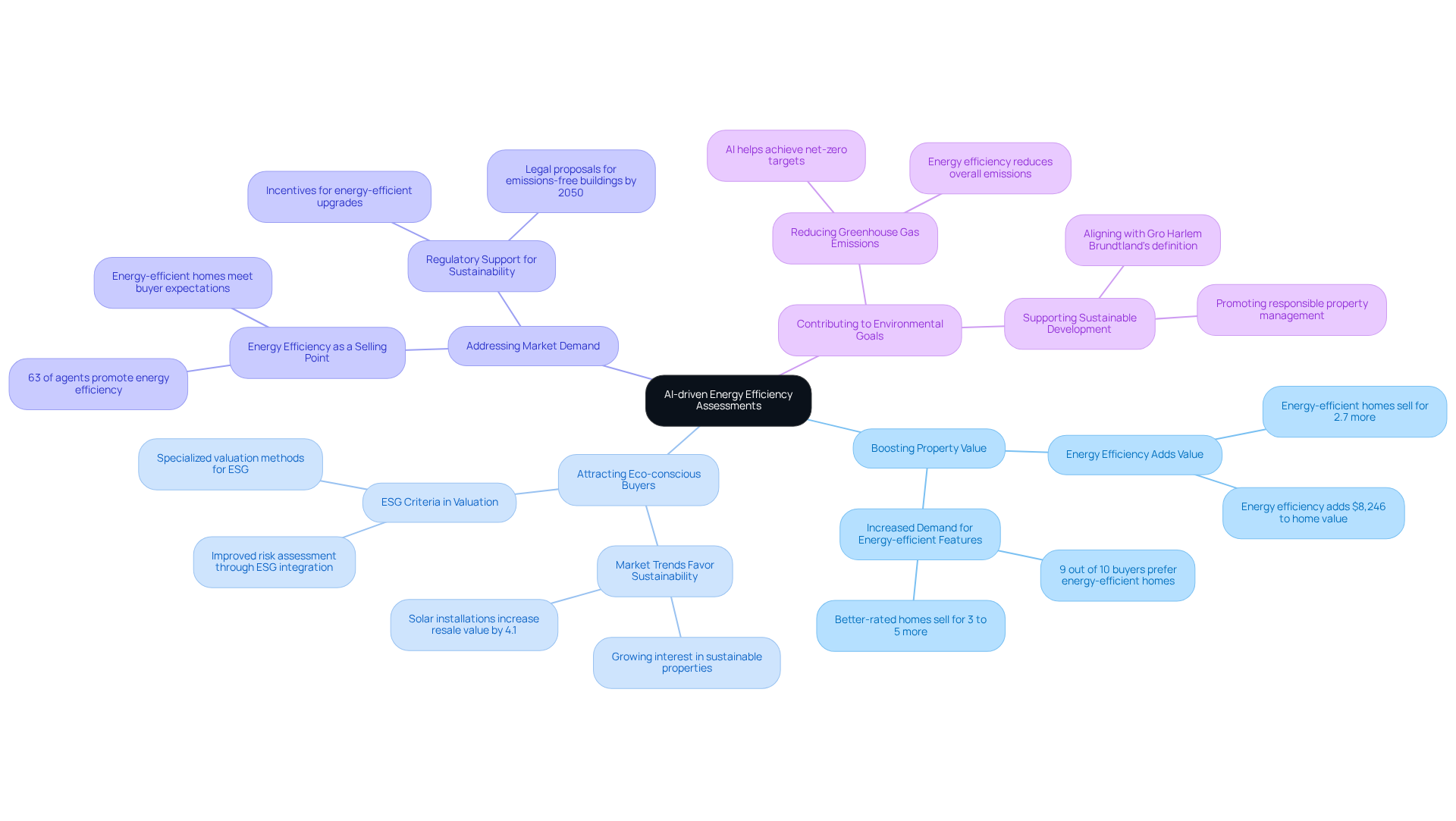
Conclusion
The integration of AI trends in property technology is fundamentally reshaping the landscape of title research and real estate transactions. As the sector embraces innovative solutions, it becomes increasingly clear that these advancements are essential tools for enhancing efficiency, accuracy, and security in property dealings. The transformative potential of AI is undeniable; it empowers professionals to streamline processes, reduce errors, and make data-driven decisions that ultimately benefit clients and stakeholders alike.
In this article, various AI applications have been explored, including:
- Automated document processing
- Predictive analytics
- Virtual property tours
- Personalized marketing campaigns
- Advanced fraud detection systems
Each of these trends significantly contributes to a more efficient and responsive real estate environment, enabling professionals to meet the evolving demands of the market. The statistics and case studies presented illustrate the substantial impact of these technologies, from improving customer engagement to enhancing transaction security.
As the real estate industry continues to evolve, embracing AI technology is not merely an option—it is a necessity for maintaining competitiveness and relevance. Property professionals must actively explore these AI trends, leveraging them to enhance their services and drive sustainable growth. By adopting these innovations, the industry can not only improve operational efficiency but also contribute to a more sustainable future in property management.
Frequently Asked Questions
What is Parse AI and how does it benefit title research?
Parse AI utilizes advanced machine learning algorithms and optical character recognition to automate the extraction of critical information from title documents. This automation reduces the time and effort title researchers spend on compiling abstracts and reports, minimizes human errors, and enhances data accuracy, resulting in a faster and more reliable process for property professionals.
Why is the incorporation of AI trends in property technology important?
The incorporation of AI trends in property technology is essential as it boosts efficiency and precision in processes like title document automation. The adoption of AI in the industry has increased significantly, with Gartner reporting a surge of over 270% in AI adoption among businesses, reflecting a broader trend in the real estate sector.
What is the projected growth of the global AI market by 2027?
The global AI market is projected to experience significant growth by 2027, highlighting the necessity for title researchers to adopt AI trends in property technology to remain competitive and efficient.
How does predictive analytics enhance market forecasting in real estate?
Predictive analytics uses historical data and machine learning models to forecast future market trends and property values. By analyzing data patterns, real estate professionals can make informed decisions regarding investments and pricing strategies, identify emerging markets, and mitigate potential risks.
What role do virtual property tours play in buyer engagement?
Virtual property tours, enhanced by AI technology, allow prospective buyers to explore listings from home, providing a realistic view of property layouts and features. This increases buyer engagement, attracts more prospects, and facilitates quicker decision-making, ultimately leading to increased sales.
What are the benefits of implementing intelligent document processing (IDP) systems in title research?
Businesses that implement intelligent document processing (IDP) systems can quantify their return on investment (ROI) through time and cost savings, demonstrating the advantages of automation in title research.




